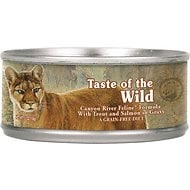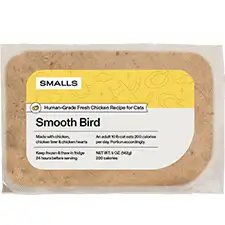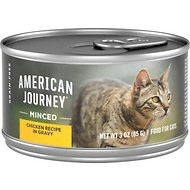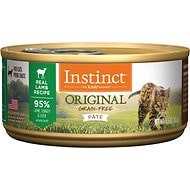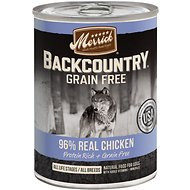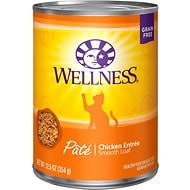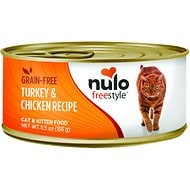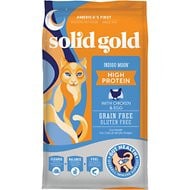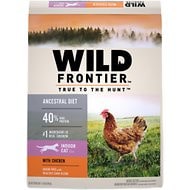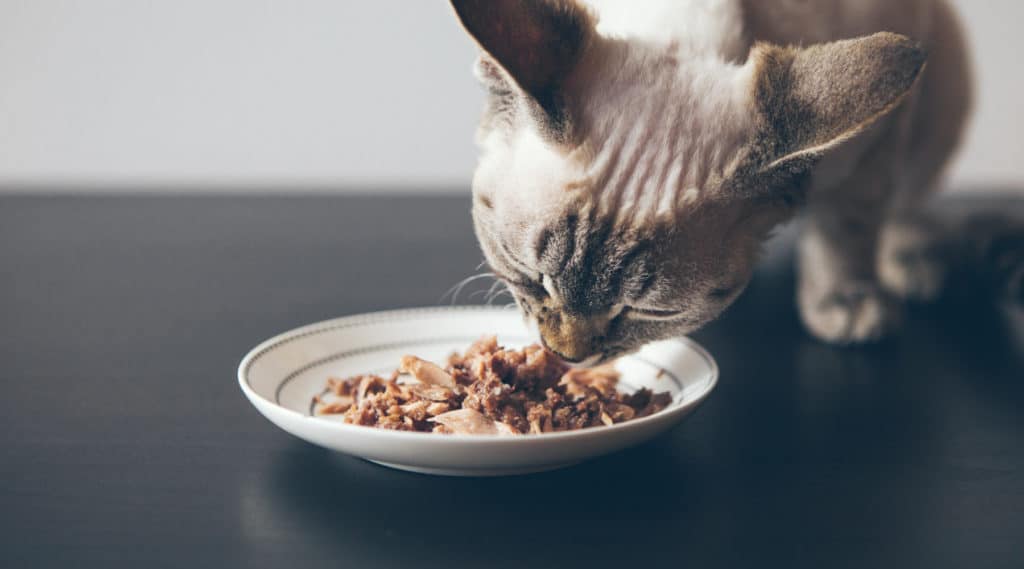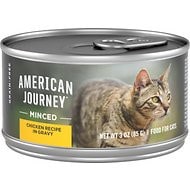Contents
- What Is The Best Cat Food For Hyperthyroidism?
- Understanding Hyperthyroidism in Cats
- Treatment and Diet for Hyperthyroidism
- What to Look for in a Good Cat Food for Hyperthyroidism
- How Do We Make Our Recommendations?
- The 9 Best Cat Foods for Hyperthyroidism
- 5 More Top-Rated Cat Foods for Hyperthyroidism
- Merrick Backcountry Grain-Free Chicken Recipe Canned Food
- Wellness Complete Health Pate Chicken Entrée Grain-Free Canned Food
- Nulo Freestyle Turkey & Chicken Recipe Grain-Free Canned Cat & Kitten Food
- Solid Gold Indigo Moon with Chicken & Eggs Grain-Free High Protein Dry Cat Food
- Wild Frontier Indoor Adult Open Valley Recipe Chicken Flavor High-Protein Dry Cat Food
- Frequently Asked Questions
As cats get older, they tend to become less active and may not eat as much. Over time, you may even notice weight loss and loss of muscle mass. Before you just write these symptoms off as normal for an older cat, take a moment to learn about a condition that commonly affects cats 12 years and older – it’s called hyperthyroidism.
Unexplained weight loss, increased thirst, and poor coat condition are all potential signs of hyperthyroidism. Before you panic and rush your cat to the vet, know that hyperthyroidism is a serious condition, but it is also very treatable and is completely curable in most cases. Don’t delay in seeking treatment for your cat because he could develop serious complications but rest easy knowing that there is a highly effective form of treatment that could cure your cat in as little as one to two weeks. Add to that a high-protein, energy-rich diet and your cat will be good as new in no time.
| Our 2024 Picks: Best Cat Foods for Hyperthyroidism | ||
|---|---|---|
| Smalls Fresh Cat Food Delivery | Our Top Pick
| VIEW LATEST PRICE → |
| Taste of the Wild Canyon River Grain-Free |
| VIEW LATEST PRICE → |
| American Journey Minced Chicken Recipe In Gravy |
| VIEW LATEST PRICE → |
| Nature’s Variety Original Grain-Free Real Lamb |
| VIEW LATEST PRICE → |
| Merrick Backcountry Grain-Free Chicken Recipe |
| VIEW LATEST PRICE → |
| Wellness Complete Health Pate Chicken Entrée |
| VIEW LATEST PRICE → |
| Nulo Freestyle Turkey & Chicken Recipe Grain-Free |
| VIEW LATEST PRICE → |
| Solid Gold Indigo Moon with Chicken & Eggs Grain-Free |
| VIEW LATEST PRICE → |
| Wild Frontier Indoor Adult Open Valley Recipe |
| VIEW LATEST PRICE → |
In this article, we’ll explore the subject of hyperthyroidism in cats to determine the most common symptoms, underlying causes, and best forms of treatment. You’ll also learn about the link between hyperthyroidism and diet to help you choose a better cat food for your feline friend. Finally, you’ll see reviews of our top picks for the best cat food for thyroid problems.
What Is The Best Cat Food For Hyperthyroidism?
- Smalls Fresh Bird Cat Food Delivery
- Taste of the Wild Canyon River Grain-Free Canned
- American Journey Minced Chicken Recipe in Gravy
- Nature’s Variety Original Grain-Free Real Lamb Recipe
- Merrick Backcountry Grain-Free Chicken Recipe Canned Food
- Wellness Complete Health Pate Chicken Entrée Grain-Free
- Nulo Freestyle Turkey & Chicken Recipe Grain-Free
- Solid Gold Indigo Moon with Chicken & Eggs Grain-Free
- Wild Frontier Indoor Adult Open Valley Recipe Chicken
Understanding Hyperthyroidism in Cats
In humans, the thyroid gland sits in the lower front of the neck. It is part of the adrenal system that secrets hormones which help regulate essential bodily functions like metabolism, growth, and body temperature. Unlike humans, cats have two thyroid glands. They too are located in the neck and play a role in regulating the metabolism.
Hyperthyroidism is a condition in which the thyroid glands produce too much thyroid hormone which results in an increased metabolic rate. Most commonly seen in older cats, hyperthyroidism can lead to increased appetite and unexplained weight loss.
Here are some of the primary symptoms of hyperthyroidism in cats:
- Increased appetite
- Unexplained weight loss
- Excessive thirst
- Poor coat condition
- Increased urination
- Hyperactivity
- Increased shedding
- Diarrhea or vomiting
Because the thyroid glands regulate metabolic rate, hyperthyroidism has an impact on several organs including the heart. Untreated hyperthyroidism can lead to two heart-related complications: hypertension and thyrotoxic cardiomyopathy.
Hypertension is just another name for high blood pressure and, in some cases it is mild. For cats with hyperthyroidism, however, there is a risk that the blood pressure will become so high that it affects the eyes and may cause retinal bleeding or detachment, resulting in blindness. Thyrotoxic cardiomyopathy is a specific form of heart disease which occurs when the heart muscle enlarges and thickens to meet the increased metabolic demands. This can lead to the development of a heart murmur.
Treatment and Diet for Hyperthyroidism
Hyperthyroidism can occur at any age, though it is most commonly seen in cats between 12 and 13 years of age. Only about 5% of cats that develop the condition are younger than 10 years of age. This condition can affect both male and female cats of any breed, though certain breeds do seem to be predisposed to the problem. On the other hand, Siamese, Burmese, Persian, Himalayan, and Abyssinian breeds appear to have a lower incidence of the disease. Environmental risk factors may play a role in predisposing a cat to hyperthyroidism and high levels of dietary iodine may be involved.
The exact cause for hyperthyroidism in cats is unknown, though research is being conducted to better understand the role of dietary iodine as an influencing factor. Diagnosis of the condition involves a blood test to check thyroid hormone levels, specifically total thyroxine (TT4). In most cases where cats have begun to display symptoms, TT4 levels are very high that the blood test alone is enough to confirm a diagnosis. If not, a second test to check other thyroid levels or a thyroid scan may be conducted.
When it comes to treating hyperthyroidism in cats, there are four primary options:
- Medication
- Radioactive iodine therapy
- Surgery
- Dietary therapy
Anti-thyroid medications work by reducing the production and release of thyroid hormone – they do not provide a cure but can be used for either short-term or long-term treatment. Radioactive iodine therapy is the treatment of choice, however, because it destroys abnormal thyroid tissue without damaging the surrounding tissue, providing a more permanent form of treatment. In more serious cases, surgical removal of the thyroid glands may be required.
In addition to or as an alternative to these forms of treatment, some veterinarians recommend dietary changes to help treat or manage the condition. Some studies suggest that switching to a low-iodine diet may help, especially in cats with underlying medical conditions that make other treatments unviable. The long-term effects of iodine restriction are still being studied, however, so it may not be your veterinarian’s first recommendation.
If you are considering dietary changes as a supportive therapy to other forms of hyperthyroidism treatment, the best bet is a high-protein, high-energy formula to help your cat regain weight and muscle mass to improve health and overall bodily function.
What to Look for in a Good Cat Food for Hyperthyroidism
If your veterinarian recommends an iodine-restricted diet for your cat, you may need to feed him a prescription diet. The only product currently available on Chewy is Hill’s Prescription Diet y/d Thyroid Care which comes in both a dry food and a canned food recipe. This formula is designed specifically for cats with thyroid problems but keep in mind that it does contain by-products as well as corn-based ingredients. We cannot recommend it as a high-quality cat food, but it may support your cat’s thyroid treatment if your veterinarian recommends it.
If you’re simply looking for a cat food to help your cat regain weight and muscle mass for improved health during hyperthyroidism treatment, here are some of the things to look for:
- High-quality, natural ingredients. One of the primary goals of changing your cat’s diet to support his hyperthyroidism treatment is to help him regain his health. High-quality, natural ingredients are a rich source of nutrients and will be more biologically valuable for your cat than supplements, but the recipe should still be fortified with supplements for nutritional balance.
- Rich in animal protein. All cats require a protein-rich diet, but protein is particularly important for cats trying to recover from hyperthyroidism. Increased metabolic activity often results in weight loss and loss of muscle mass, so increasing your cat’s protein intake will help him gain weight and rebuild muscle.
- Energy-rich. Due to increased metabolic activity, many cats with hyperthyroidism end up losing weight. To help your cat restore his healthy body weight, look for a calorie-dense diet. Fat is the richest source of calories for cats and it is most biologically valuable when it comes from animal-based ingredients.
- Higher moisture levels. Cats with hyperthyroidism often exhibit increased urine output which can lead to dehydration. If your cat needs help balancing out his moisture intake, switching to wet food or adding a moist cat food topper to his kibble might help.
- Complete and balanced. All cats require a complete and balanced diet, but balanced nutrition is especially important for underweight cats trying to recover from hyperthyroidism. High protein and energy content are recommended, but make sure your cat gets the other nutrients he needs as well.
Once your cat has regained its weight and muscle mass, you may want to reduce the amount you feed him to prevent unhealthy weight gain. As long as his thyroid hormone levels have normalized, you can resume normal feeding with a healthy and balanced diet. If your cat has concurrent kidney problems resulting from the hyperthyroidism, you may want to look for more moderate levels of protein and ask your veterinarian about other dietary factors to support his treatment.
Now that you have a better understanding of hyperthyroidism in cats and the role diet may play in your cat’s treatment, you’re ready to start shopping. If you need additional guidance, check out our top picks below but read how we make our recommendations first.
How Do We Make Our Recommendations?
Cats are obligate carnivores which means that they have a biological requirement for a high-protein diet. In the wild, cats only consume plant matter in the stomach contents of their prey. Keeping these dietary requirements in mind, we only recommend cat foods that are rich in animal protein with limited carbohydrate ingredients. We prioritize recipes that contain a real source of animal protein as the first ingredient that is also rich in animal-based fats, with limited content of digestible carbohydrates (like whole grains or vegetables). Complete and balanced nutrition is essential as well, so we also look for recipes fortified with essential vitamins and minerals.
Here are some of the requirements for a cat food to receive our recommendation:
- A source of high-quality animal protein as the first ingredient
- At least 30% crude protein for kittens and at least 26% for adults
- A minimum of 9% crude fat for kittens and adults
- A balance of omega-3 and omega-6 fatty acids, primarily from animal sources
- A rich blend of nutrients from natural sources and supplements, as needed
- Limited carbohydrate content from digestible sources (like whole grains and veggies)
- No low-quality fillers, by-products, or artificial additives (preservatives, dyes, or flavors)
All of our cat food recommendations are made based, first and foremost, on AAFCO food nutrient profiles. These profiles simply outline the minimum nutritional needs of cats in various life stages (kitten or adult). In order to determine whether a cat food meets these requirements, just look for an AAFCO statement of nutritional adequacy on the package. It should look something like this: [X Product] is formulated to meet the nutritional levels established by the AAFCO Cat Food Nutrient Profiles for all life stages. After you have successfully determined that the formula is complete and balanced, you can go on to evaluating its quality.
The 9 Best Cat Foods for Hyperthyroidism
If you’re looking for a healthy cat food to support your cat’s hyperthyroidism treatment, look for a recipe rich in both animal protein and calories. Moderate-to-high fat content should meet your cat’s calorie needs, but make sure most of it comes from animal sources to ensure bioavailability. Aside from that, look for digestible carbohydrates and beneficial supplements to ensure balanced nutrition.
If you need a little help picking the right cat food to help your cat gain weight and regain his health, here are our top picks for the best cat food for hyperthyroidism support:
Smalls Fresh Bird Cat Food Delivery
Overall Best Cat Food for Hyperthyroidism: When it comes to restoring your cat’s health, a high-quality diet is key. Many pet nutrition experts agree that fresh food is one of the most nutritious options out there and Smalls is our top pick for fresh pet food companies. This company uses wholesome, natural ingredients to prepare fresh food for pets in small batches. This strategy helps preserve the nutritional quality of the raw ingredients, so your cat gets the nutrition he needs to regain his strength. Most importantly, however, Smalls can customize your cat’s meals to meet his requirements for calories to help him regain weight. All of Smalls cat food recipes are protein-rich and, because they are fresh and not cooked at high temperatures, they have higher moisture content as well.
Pros: Rich in animal protein and moisture, customizable calorie content, wholesome natural ingredients, complete and balanced nutrition, high nutritional quality, cooked in small batches
Cons: Only two recipes to choose from, significantly more expensive than traditional kibble
Taste of the Wild Canyon River Grain-Free Canned Food
Most Popular Cat Food for Hyperthyroidism: With so many different cat foods out there, it can be difficult to make a choice. In fact, there are many brands that come highly recommended from pet nutrition experts. If you’re wondering what cat owners thinks, however, you might be happy with a popular brand like Taste of the Wild. We recommend this Taste of the Wild Canyon River Grain-Free Canned Food for cats recovering from hyperthyroidism because it is rich in both animal protein and fat in addition to being complete and nutritionally balanced. The main ingredient is fresh trout with both fish broth and vegetable broth as flavorful sources of moisture, increasing the moisture content to 82%. This formula contains several protein sources with digestible grain-free carbohydrates like potato, carrots, and sweet potato. In addition to fresh fruits and vegetables as natural sources for key nutrients, this recipe is fortified with vitamins and chelated minerals to help your cat regain his health and optimal wellness from quality nutrition.
Pros: High quality natural ingredients, real animal protein, rich in moisture (82%), fresh fruits and vegetables, fortified with vitamins and chelated minerals
Cons: Could be higher in fat and calories, main source of fat is plant-based (sunflower oil)
American Journey Minced Chicken Recipe in Gravy Grain-Free Canned Food
Most Affordable Cat Food for Hyperthyroidism: High-quality cat food can cost a pretty penny, but this American Journey Minced Chicken Recipe in Gravy canned food is both good for your cat and good for your wallet. It features fresh chicken as the main ingredient with chicken liver as a supplemental source of protein and nutrients. With both chicken broth and turkey broth on the list, this recipe is rich in both natural flavor and moisture, providing a total of 82% moisture. This recipe is naturally grain-free, featuring digestible carbohydrates like peas and flaxseed as well as a rich blend of omega-3 and omega-6 fatty acids for skin and coat support. Complete and balanced, this recipe contains a dry matter value of nearly 41% protein and 18% fat.
Pros: Affordable cost, rich in animal protein and flavor, high in moisture, digestible grain-free carbohydrates, rich blend of omega-3 and omega-6 fatty acids
Cons: Could be higher in fat and calories, main source of fat is plant-based (sunflower oil)
Nature’s Variety Original Grain-Free Real Lamb Recipe Canned Food
Best Cat Food for Hyperthyroidism and Sensitive Stomach: Cats recovering from hyperthyroidism require a diet rich in protein, fat, and calories but that can be challenging if the cat also has a sensitive stomach or food allergies. In that case, the best option might be a limited ingredient diet made with a novel source of animal protein. This Instinct by Nature’s Variety Original Grain-Free Real Lamb Recipe Canned Food is a good option because it contains lamb, turkey, and turkey liver as the main ingredients and novel sources of animal protein. This recipe isn’t marketed as a limited ingredient diet, but it contains fewer than 10 main ingredients with vitamin and mineral supplements for nutritional balance. Overall, this recipe contains 10% protein and 9% fat with 78% moisture which, converted to dry matter basis, is 45% protein and nearly 41% fat.
Pros: Rich in protein and fat, very energy-dense, novel sources of animal protein, less than 10 main ingredients, complete and balanced nutrition, limited carbohydrate content
Cons: Not a single source protein recipe, may be too high in fiber for some cats
5 More Top-Rated Cat Foods for Hyperthyroidism
Merrick Backcountry Grain-Free Chicken Recipe Canned Food
When it comes to complete and balanced nutrition for your cat, you want a recipe that is rich in real animal protein and loaded with natural flavor. This Merrick Backcountry Grain-Free Chicken Recipe is a great choice because it features real deboned chicken as a single source of protein, making it great for cats with sensitive stomachs. It also contains chicken broth for moisture and flavor with limited carbohydrate content. Overall, this recipe contains a dry matter calculation of 50% protein and nearly 32% fat, making it a protein- and energy-rich diet to help your cat recover from hyperthyroidism.
Wellness Complete Health Pate Chicken Entrée Grain-Free Canned Food
Cats recovering from hyperthyroidism need a healthy and balanced diet to help restore their body weight and muscle mass. This Wellness Complete Health Pate Chicken Entrée is a good option because it is rich in animal protein and high in both fat and calories. The first three ingredients are all rich sources of real animal protein – chicken, chicken liver, and turkey – followed by chicken broth for more chicken flavor and added moisture. This recipe contains limited carbohydrate content but is rich in calories with a dry matter calculation of nearly 48% protein and 32% fat.
Nulo Freestyle Turkey & Chicken Recipe Grain-Free Canned Cat & Kitten Food
Growing kittens need a protein-rich recipe to help them grow and develop. In their old age, cats need the same thing – plenty of protein to help them maintain that muscle mass. This Nulo Freestyle Turkey & Chicken Recipe Grain-Free Canned Cat & Kitten Food is a good option for cats of all ages, including cats recovering from hyperthyroidism, because it is a rich source of animal protein with plenty of healthy fats and calories. Turkey, chicken, and turkey liver are the first three ingredients followed by turkey broth and fresh turkey for additional protein and moisture. This recipe is rich in omega-3 and omega-6 fatty acids but is still complete and balanced to ensure your cat’s optimal nutrition.
Solid Gold Indigo Moon with Chicken & Eggs Grain-Free High Protein Dry Cat Food
Some cats simply prefer dry food. If that’s all your cat wants to eat, you should at least choose a high-protein recipe to help him regain his strength and muscle mass. This Solid Gold Indigo Moon with Chicken & Eggs Grain-Free High Protein is a good option because it contains 42% protein and 20% fat with 475 calories per cup – that should help your cat gain weight and rebuild muscle. You’ll also be glad to know that it contains digestible grain-free carbohydrates like potatoes and peas with plenty of omega-3 and omega-6 fatty acids for healthy skin and coat.
Wild Frontier Indoor Adult Open Valley Recipe Chicken Flavor High-Protein Dry Cat Food
Protein is essential for all cats, but particularly for cats trying to regain healthy body weight and muscle mass. If your cat prefers dry food, try this Wild Frontier Indoor Adult Open Valley Recipe. It features fresh chicken and chicken meal as the top two ingredients with chicken fat as a nutritious source of essential fatty acids and calories. This recipe contains several supplemental sources of protein with flaxseed to ensure the right balance of omega-3 and omega-6 fatty acids. Overall, this formula contains 40% protein with 16% fat and 391 calories per cup.
Frequently Asked Questions
- Can hyperthyroidism kill a cat? Hyperthyroidism is most commonly seen in older cats – the average age of onset is 12 to 13 years. At this advanced age, cats are already at risk for other health problems. The primary issue with hyperthyroidism, however, is increased metabolic activity which can lead to weight loss and muscle loss, another serious issue for older cats. Left untreated, it can also cause cardiac complications which can impact your cat’s health. When properly treated, however, hyperthyroidism is curable. There is no reason hyperthyroidism needs to take your cat’s life.
- How do you treat hyperthyroidism in cats naturally? The most effective form of treatment for hyperthyroidism in cats is radioactive iodine therapy. This therapy eliminates abnormal thyroid tissue without harming the surrounding tissues and it has a low risk for side effects. In many cases, only a single treatment is necessary and the cat’s hormone levels should normalize within one to two weeks. Because this is such an effective form of treatment, there is no need to look for natural remedies – they are unlikely to be effective anyway. The only natural treatment that can help your cat recover is a healthy and balanced diet.
- How long does a cat live with hyperthyroidism? Hyperthyroidism is most common in older cats, particularly those over 12 years of age. This being the case, you might not expect your cat to live more than another 3 to 5 years regardless of hyperthyroidism. In younger cats, prompt treatment can result in a better prognosis as long as the cat hasn’t developed cardiac complications.
- What happens if hyperthyroidism goes untreated in cats? The first thing to remember about hyperthyroidism in cats is that it is both treatable and curable – there is no reason to leave this condition untreated. If you’re worried about the risks of treatment, know that radioactive iodine therapy is the most effective form of treatment and it has a low risk of side effects. On top of that, many cats require only one treatment and recover within 1 to 2 weeks. Left untreated, your cat may lose too much weight due to increased metabolic activity which can lead to its own problems. Untreated hyperthyroidism can also lead to cardiac complications like hypertension and thyrotoxic cardiomyopathy.
- Can a cat with hyperthyroidism gain weight? One of the primary symptoms of hyperthyroidism in cats is weight loss due to increased metabolic activity. In many cases, the cat eats a normal or above-average amount of food but continues to lose weight. To help your cat gain weight, you need to increase the protein and calorie content of his diet and ask your veterinarian about curative treatments. With proper treatment and dietary changes, your cat can gain weight.
Hyperthyroidism is a serious condition but a totally treatable one. Left untreated, it can cause your cat to lose an unhealthy amount of weight and may lead to cardiac complications. The good news is that a single treatment with radioactive iodine therapy could cure your cat and making healthy changes to his diet could help him regain weight and restore his health.
If your veterinarian recommends an iodine-restricted diet, we encourage you to follow his recommendations until your cat’s thyroid hormone levels normalize. If you’re simply looking for a healthy diet to supplement your cat’s hyperthyroidism treatment, however, try one of the recipes we’ve reviewed above. Best of luck to you and your cat!

